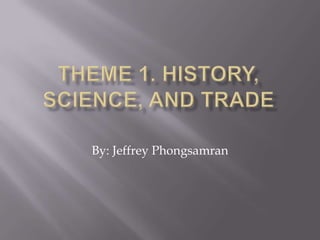
Theme 1
- 1. Theme 1. History, Science, and Trade By: Jeffrey Phongsamran
- 3. Everything has an affect on history. Civilizations have been created and destroy by to trade, climate, and disease.
- 4. Had Columbus not been motivated to establish trade routes , he may not have visited the western hemisphere leading to large waves of migration from Europe to the new world.
- 5. Had the climate in the 6th century been more favorable, Rome may have been around for a longer period of time
- 7. Historical facts are based on at least two sources:
- 8. (1) Witness from the event.
- 9. (2) Recordings by someone gathering information from other witnesses and recordings.
- 10. Because of conflicting views and limited sources of recordings or physical evidence, it’s important to verify facts before interpreting them. Any story can be edited or fictionalized.
- 11. Historical Proof comes from:
- 15. People react the way they do based on what they know.
- 16. The universe is constantly changing as we learn new things and it changes the way we live.
- 17. Viewpoint is the way that different people view and interpret the meaning if a historical event.
- 18. History is important because people learn from past mistakes, If nothing was ever recorded history would continue to repeat it self.
- 20. By traveling the world and gathering DNA he has concluded that humans today may be related to a man who lived in Africa 60,000 years ago.
- 21. Genetics and molecular biology in humans has been extremely important in finding where modern humans first evolved.
- 22. African populations have the most ancient alleles and the greatest genetic diversity, which means they’re the oldest
- 24. 100,000 years ago, hominids populated the earth in Africa, Southeast Asia and China, and Neanderthals in Europe.
- 25. 30, 000 years ago, only surviving hominid species was H. sapiens.
- 26. Homo Sapiens were anatomically similar to the modern man 150,000 years ago, but became more cognitive due to a genetic mutation making us smarter about 50,000 years ago.
- 28. By looking at tree rings scientist could see when the climate was favorable or not by how well the tree was growing.
- 29. By reading layers of ice scientist were able to discover what was in the atmosphere at certain times.
- 31. Records of the past show that the sky's were dark for an abnormal period of time, winters were harsh and long, and summers was short.
- 32. These catastrophic results on the climate were disastrous to civilizations and may have led to their downfalls.
- 34. Native populations were fairly large before the arrival of European explorers.
- 35. When large waves of settlers began to come in, they found abandoned Indian settlement… had it not been for these settlements the settlers may have starved to death.
- 36. The natives were being killed off by disease. They did not know to isolate people who are sick, instead they gathered around the sick causing disease to spread even faster.
- 38. It is believed that these large populations could have been killed off by epidemic disease just like the Native Americans. Evidence like pot shards and old plazas in the jungle point to large civilizations and advances civilizations.
- 39. There is evidence that the Amazons were able to live in the land thought uninhabitable. They had pretty advanced soil management that would be able to support large populations.
- 41. During the late 1400’s early 1500’s Asia had many trade goods that were desired by the Europeans. Asia had temples of gold, silk, and spices that were in high demand. Because of this Columbus was trying to discover a new trade route, instead he found a new world.
- 42. America and its abundance in natural resources eventually became the new place to create wealth. Europeans were willing to travel for months to get to the new world and trade.
- 44. First place to live off potatoes in Europe was Ireland. In the 1600’s the British resorted to scorched earth policy to starve out rebels. However because potatoes could grow underground and were hard to burn out the potato became the salvation of a hungry continent.